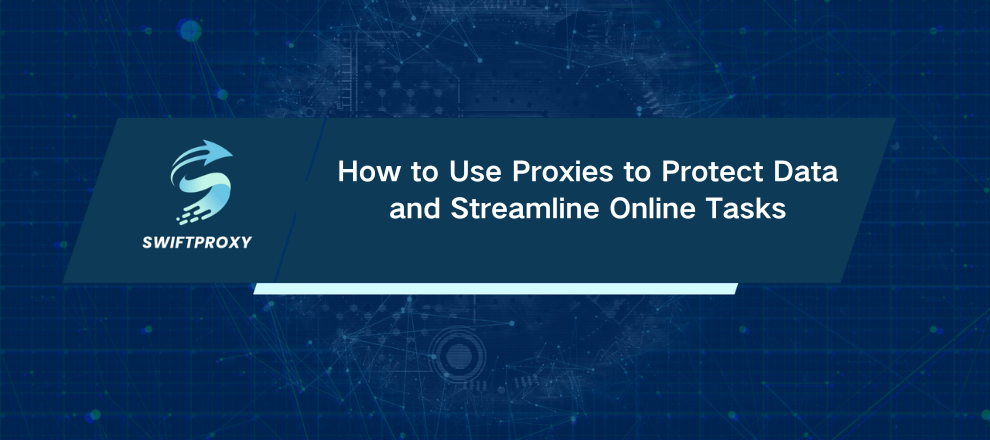How to Use Proxies to Protect Data and Streamline Online Tasks

Imagine that one IP address gets blocked every 10 minutes while scraping a website. Frustrating, right? That's where proxies come in. They aren't just tools—they're your invisible shield online. Whether you're scraping data, monitoring SEO, automating ecommerce orders, or accessing restricted content, proxies are game changers. But how many do you actually need? Let's break it down.
What Are Proxies and Why You Need Them
A proxy is a middleman between your device and the websites you visit. Simple? Yes. Powerful? Absolutely. Here's what they do for you:
Mask your IP: Hide your location, identity, and online activity.
Enhance privacy: Filter cookies, ads, and trackers that might compromise security.
Bypass restrictions: Access geo-blocked or censored content.
Boost performance: Cache frequently used files to reduce load times.
Common Use Cases
Web scraping: Avoid IP bans, captchas, and anti-bot measures while collecting data for market research or competitive analysis.
SEO monitoring: Simulate searches from different regions to check keyword rankings accurately.
Ad verification: Audit campaigns to ensure ads display correctly and detect fraud.
How Many Proxies You Actually Need
The answer depends on your task, scale, and goals. Let's dive into specifics.
1. Web Scraping and Automation
Scraping or automating data-heavy tasks requires access to multiple sites without getting blocked. Challenges include:
Anti-bot measures (captchas, rate limits, IP bans)
Geo-restrictions
Complex or dynamic website structures
Maximize efficiency and bypass blocks by using rotating proxies or combining a proxy with an API.
2. Ecommerce Order Automation
Placing automated orders across multiple stores? Proxies help you:
Avoid IP bans from repetitive requests
Access geo-restricted products or prices
Keep your identity private and secure
One proxy per account or session is often enough. Sticky sessions help maintain consistency.
3. Basic Privacy and Content Access
Want unrestricted browsing and privacy? Proxies can:
Bypass geo-blocks to stream content or access websites unavailable in your region
Hide your identity, location, and traffic from trackers
Encrypt data to prevent snooping
For casual access, a few reliable residential proxies often do the trick.
4. Multiple Accounts Management
Social media, marketplaces, or gaming accounts? Here's the challenge:
Captchas
Rate limits
IP bans
Sticky sessions provide a unique, consistent IP for each account, reducing blocks and captchas.
5. SEO Monitoring
SEO tasks require lots of requests to search engines. Proxies help you:
Simulate searches from multiple locations
Avoid IP bans
Protect privacy
One proxy per 100 requests per day, adjusting for your specific traffic and goals.
Scale Matters
Small-scale tasks: A few proxies with sticky sessions are enough. Examples: checking your website ranking or streaming geo-blocked content.
Large-scale tasks: Hundreds or thousands of requests across many sites? You need rotating proxies to switch IPs frequently and stay under the radar.
Choosing the Right Proxies
Not all proxies are created equal. Key types:
Residential: Reliable, secure, harder to block, perfect for scraping and automation.
Mobile: Hard to detect, great for mobile-specific sites, but slower and more expensive.
Datacenter: Fast, cheap, but easier to block. Good for low-risk tasks.
Rotating proxies: Automatically change IPs to reduce detection. Works across residential, mobile, and datacenter proxies.
Smart Proxy Management
Start small. Test quality, reliability, and performance before scaling. Monitor metrics like:
Latency: How fast the proxy responds.
Throughput: Data it can handle per second.
Reliability: Consistency of connection.
Anonymity: How well it hides your identity.
Tools like Proxy Checker, Datadog, or HAProxy Stats help track these in real-time.
Budgeting for Proxies
Estimate your budget based on revenue, goals, and task scale.
Determine the proxy type and number you need.
Compare options and adjust based on cost-efficiency.
Continuously monitor and scale proxies as required—don't overspend on unused resources.
Where to Find Reliable Proxies
Providers like Swiftproxy offer a wide range of proxies: residential, mobile, datacenter, and rotating. Benefits include:
Large, diverse proxy pools across countries
Support for HTTP, HTTPS, and SOCKS5
Flexible pricing and pay-as-you-go options
High reliability and user-friendly dashboards
API integration for automation
Conclusion
The number of proxies you need depends on your task, scale, and security requirements. The key? Test, monitor, and optimize. Use proxies smartly—avoid wasted costs and blocked access, while keeping your data safe. When done right, proxies transform how you work online, from scraping data to automating processes efficiently and securely.

















































